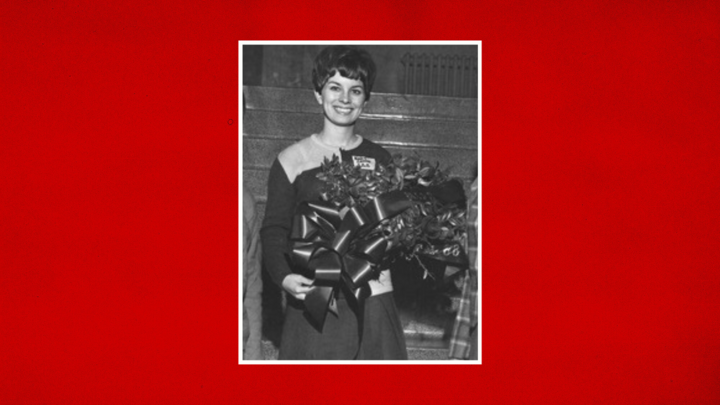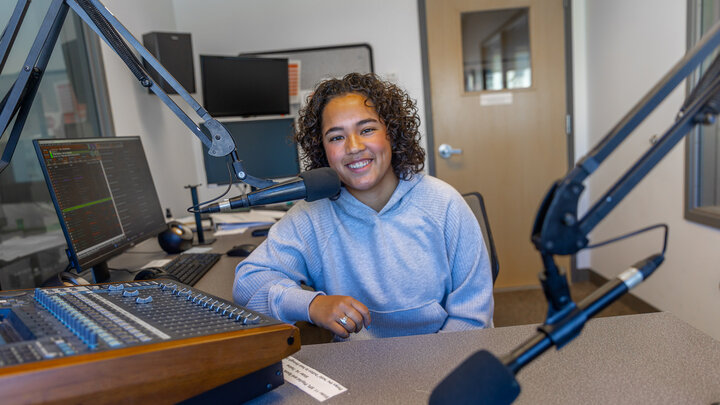After more than 30 years, I was finally able to attend Homecoming and was invited to a CoJMC event. Knowing that he had retired after an incredibly long career, I did not expect Larry Walklin to attend, but hoped that someone there would know how to reach him. I wanted to talk with him again about the times we had shared and the impact he had had on my life.
My high school experience with tight deadlines and the on-air time in a Junior Achievement company sponsored by KFAB producing a weekly radio show hooked me on broadcasting.
Under the direction of Neil Copple, each of us, no matter what our concentration, were put through all the journalistic hoops and imbued with a deep sense of ethics while questing for truth and accuracy. Our location in Nebraska Hall was not large, but it housed everything necessary for us to feel we were operating in a professional news environment. Our radio studio was tiny and we shared tv facilities in the basement of Temple Hall where we had to brace one foot in front of the behemoth camera to keep it from rolling on the uneven floor into the sets!
Larry Walklin joined the faculty in 1967, and under his guidance, the broadcasting students became involved in trying to establish a campus radio station while bringing awareness to the larger student body.
Even though our Midwestern campus was somewhat isolated, leaders from the Students For Democratic Society (SDS) were present and student protests against the Viet Nam War were on the rise. Absorbing the events of the war, while also listening to left-leaning agitators, I lost confidence in our government, but did not actively protest.
During my sophomore summer while visiting my parents in their new Florida home I met the neighbor’s son, a USNA graduate who was passing through on his way from flight training to his first squadron in Virginia. At the very moment my head was grappling with conflicting ideas, my heart was won by a man who had vowed to serve his country—to die for it, without reservation, even if wrongheaded decision makers were sending him toward his uncertain fate. Suddenly, I cared even more about ending the war because I didn’t want to lose him there.
My father’s connection to the space program at Cape Canaveral provided me materials for a broadcast on the Apollo project. Weeks of work culminated in a multimedia presentation timed to the minute. When it all went wrong from the first moment, it was Larry Walklin who calmed me, and allowed me to begin again even though I knew that would never happen in an actual broadcast. There were two life lessons there:
- When anyone gets off on the wrong foot when trying something for the first time, they need kindness to gain the confidence to try again
- If necessary, as it was in my case, show someone gently how to improve if they are not yet “ready for prime time”.
Before finishing my degree (and with a promise that I would, complete it as soon as possible) I took one semester off to begin married life, knowing that it might be the only time I would have with my husband before he deployed. The J-School and my sorority held a place for me and I began correspondence courses to keep up my credit count. Then, after the saddest of farewells, I drove, alone, half way across the country to re-enter my previous world--a bit older, a little wiser--with a different perspective that only deepened my opposition to the war.
My new Navy “family” offered their support, warning me to beware of any mischief that might come my way from student activists, and assured me that a personal representative would come to my door if something terrible happened. Therefore, I was caught off guard when the squadron commander’s wife called me only a few weeks after I had settled into off-campus housing. In a few heart-stopping moments she told me that my husband’s plane had crashed into the ocean. He had been rescued and was back on the aircraft carrier, but his pilot had gone down with the plane. With one phone call I shifted from being a student with a loved one away at sea back to a Navy wife with duties and obligations.
I spoke with Dr. Walklin and, as quickly as possible, was on a plane headed back to Virginia to take my place next to the widow. Together, over the next weeks, we planned a memorial service and managed the details of people who needed to be notified, out-of-town guests to house, meals to supply, and necessary correspondence. At some point, the family minister reminded me that I had a life to return to. I needed to complete my degree and could not afford more time away.
Back at NU, I immersed myself in classes and daily activities, but my life had shifted. That spring when plans to invade Cambodia were announced, there was a call for university students to strike nationwide. After my experiences I really wanted the war to end, just end. I wondered how a student strike would have any impact on the leaders who continued to sacrifice lives for an unattainable victory. The volunteers of past wars, who fought for their ideals of patriotism, honor, and duty to country had been replaced by an assortment of draftees with few other options, and others, many pulled from universities like mine, who were completely against what they saw as a pointless, unnecessary war.
The student event felt manipulated, and the atmosphere felt dangerous. I left before the vote, but the passage meant that soon I had to negotiate how to complete my final degree requirements with suspended classes. If the strike was protracted, I would be unable to earn my degree before leaving. As my very personal world clashed with my ideals, I became more cynical about those in power whose decisions were leading to so many pointless deaths and wondered if anything would lead to a change in policy.
The strike was short, and the administration made sure that seniors were able to finish everything necessary on time. As the voice of the graduation broadcast, I was sad that I hadn’t quite made it to the finish line myself. Once I completed a final correspondence course a few months later my “pomp and circumstance” consisted of a letter in the mail. I never had the chance to thank those who had made it possible for me to complete my degree.
When I was finally able to return to Nebraska in 1986 my goal was to find Dr. Walklin in order to thank him for all his support during those tumultuous times. The thrill of having him remember me was completely eclipsed by his confession that during my personal challenge in 1970, knowing I might need extra care, he had contacted all my professors, in and out of J-school, gathering their commitment to watch over me when I returned to campus. I never knew it at the time. Finding out, all those years later, left me humble and grateful—another life lesson from Dr. Walklin.
Connecting with him again at the recent Homecoming event and sharing that gratitude was the perfect way to express how he and my J-School experiences influenced my life. No matter what profession any of us chose after our education, the humanity we learned in those years gave our lives and careers real meaning. Thank you, Dr. Walklin.— Nancy Hickok ('71)




